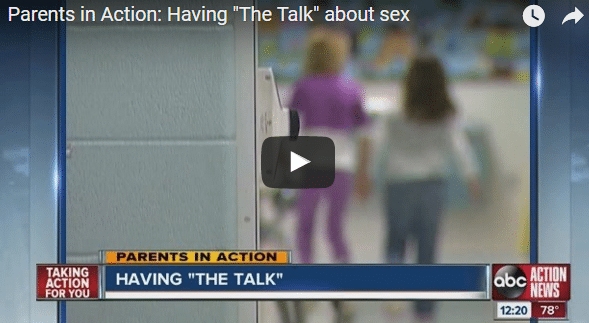HAVING “THE TALK”

According to the CDC, it’s estimated by that 97% and 96% of boys and girls respectively had received formal instruction on sex education in school, church, community centers and/or in some other places. And unlike when we were young, accessing information about sex and sexually explicit content is much easier than it was say 20 years ago.
Engaging with your child about sex will help prevent any misinformation they might have picked up at school and online as well as preparing them to make the right decisions when they are confronted by sex as tween, teens and adults.
The “Right” Age
According to Dr. Nekeshia Hammond of Hammond Psychology in Brandon, having “the talk” is not necessarily a one-time event. “It’s a series of talks”, she says in the January issue of Tampa Bay Parenting. If you have a younger child, you’ll start by introducing and teaching them about their bodies. Then as your child ages, “the talk” will progressively become more detailed and informative. Dr. Hammond also provides this breakdown.
Preschool: This is an appropriate time to talk to children about body parts. They will often have questions like, “Why do boys have penises and girls have vaginas?” While your child may have pretend names for body parts, be sure to use the correct anatomy terms when explaining body parts.
Early elementary school: By this time, children become very curious about things like kissing, and they have probably seen forms of intimacy on TV that they have questions about. Some elementary school children are already discussing elements of sexuality so this is a good time to begin a cursory, kid-friendly discussion of reproduction. Some parents utilize books to begin the discussion; others use a family talk time to start the discussion.
Late elementary school: Preparation for what your child can expect during puberty is key to helping them navigate this complicated life stage. Some schools do an excellent job of sex/health education — with a signed permission slip – but they may not teach your child the values about sex you want him or her to learn.
Teens/high school: By this time, teens know what sex is. However, you should still check in with your teen to see whether they have any questions. While your teen probably won’t come to you with every question about sex, he may still be willing to ask a few questions. This is a good time to discuss your teen’s long-term goals and explain the consequences of unintended pregnancy and STDs.
The Perfect Talk
Let’s just be clear. There is NO SUCH THING as the perfect sex talk. It’s okay to admit to your child or teen that talking about sex is nerve-wracking for you. Your child will probably feel the same way depending on their age. . But starting the conversation is vitally important to letting your child know that it’s safe to discuss this very important matter. Numerous studies show that children and teens are significantly influenced by their parents’ views, although sometimes parents are left feeling as if their words make little impact. Dr. Hammond also says,
“ignore the sighs and rolling of the eyes when you are talking to your child about sex – they still hear what you are saying.”
Your Teen May Be Having Sex
At some point parents are faced with the decision to give their children protection in the form of condoms, birth control pills, or other mechanisms to protect against pregnancy and/or STDs. Whether or not you choose to supply your kid with condoms, you do need to make your decision as a parent and tell your child why you are taking your stance on the issue. Some parents believe in an abstinence approach while other parents may provide birth control/STD protection. Still other parents may choose to teach their teens ways to protect themselves but not actually give them the tools with which to do it. Again, parents should make this decision early and explain their choices to their children.
For more information or to read Dr. Hammond’s complete article, visitTBParenting.com.